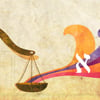Mandated by the Bible, Passover is celebrated by Jewish people as an annual commemoration of the Exodus from Egypt. It is observed for eight days (seven in Israel) during the springtime month of Nisan. Read more...
Primary Passover observances include:
- Neither owning nor benefitting from chametz (anything containing grain that has risen, including virtually all breads, cakes, crackers, pastas, whiskeys and beers) from the morning preceding Passover until the holiday has ended.
- The entire home is thoroughly cleaned, all traces of chametz are purged from the kitchen, and whatever remains is sold to a non-Jew for the duration of the holiday.
- On the first night of Passover (and the following night in the Diaspora) a festive meal, called a Seder, is held. Some highlights of this meal, which comprises 15 steps:
-
- Retelling the story of the Exodus, elaborating on the text contained in the Haggadah, the traditional guide-book to the Seder experience. This begins in response to the Four Questions (Ma Nishtana) traditionally asked by a child.
- Eating matzah, flat, hard “bread” that was baked before it had a chance to rise, to recall our ancestors’ urgent flight from Egypt—they left in such a hurry that there was no time for their bread to rise.
- Eating bitter herbs to reexperience the bitter taste of slavery.
- Throughout the evening, drinking four cups of wine or grape juice, imbibing the intoxicating sweetness of freedom.
- The first, second, seventh, and eighth days of the holiday (just the first and seventh in Israel) are yom tov, when work is restricted and festive meals are enjoyed.
- On the final day, Yizkor (the memorial prayer for our departed loved ones) is said, and a special meal (“Moshiach’s Meal”) is enjoyed during the waning hours of the holiday, in anticipation of the Redemption yet to come.
















Join the Discussion